#der Prophet
Text
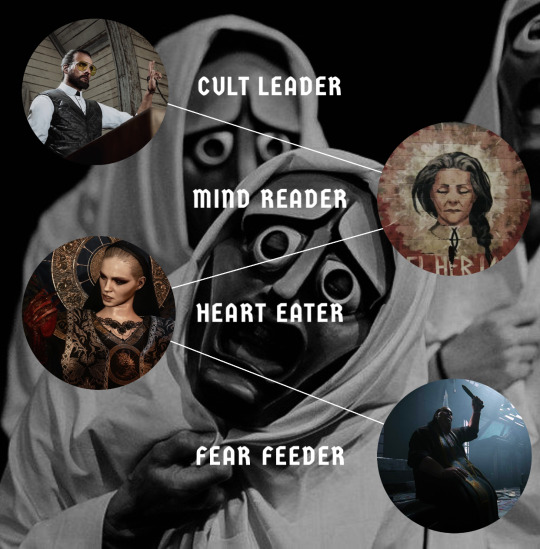

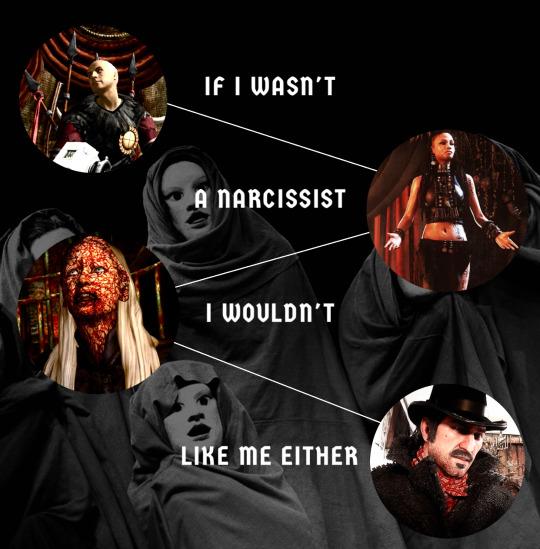
I DON'T NEED YOUR ROSES, I LIKE MEN ON THEIR KNEES
Humans, however, can't live very long without some sense of a continuing story. Such stories go beyond the limited rational system with which you surround yourself; they are crucial keys to sharing time-experience with others. Now a narrative is a story, not a logic, nor ethics, nor philosophy. It is a dream you keep having, whether you realize it or not. Just as surely as you breathe, you go on ceaselessly dreaming your story. And in these stories you wear two faces. You are simultaneously subject and object. You are a whole and you are a part. You are real and you are shadow. "Storyteller" and at the same time "character". It is through such multilayering of roles in our stories that we heal the loneliness of being an isolated individual in the world. Yet without a proper ego nobody can create a personal narrative, any more than you can drive a car without an engine, or cast a shadow without a real physical object. But once you've consigned your ego to someone else, where on earth do you go from there? At this point you receive a new narrative from the person to whom you have entrusted your ego. You've handed over the real thing, so what comes back is a shadow. And once your ego has merged with another ego, your narrative will necessarily take on the narrative created by that ego. (Haruki Murakami)
#click for better quality#far cry 5#joseph seed#the seraphite prophet#the last of us 2#sullivan knoth#outlast 2#red dead stans don’t start shit! Dutch is my Babygirl but he’s a horrible human being uwu#mother miranda#resident evil 8#edward sallow#fallout new vegas#citra talugmai#far cry 3#claudia wolf#silent hill 3#dutch van der linde#rdr2
153 notes
·
View notes
Text
Kann Gott sein Versprechen halten ?
Wenn du im Kapitel 55 Vers 11 Genau das Gleiche passiert auch mit den Worten, die ich spreche. Nichts von dem, was ich sage, wird einfach so zurückkommen, ohne dass es bewirkt hat, was ich will. Ich werde dafür sorgen, dass alles läuft, was ihr macht und was ich vorhabe.“ liest, verstehst du vielleicht, warum der lebendige Gott anders ist als alle anderen Götter!
#der einzige lebendige Gott#dem liebevollen lebendigen Gott begegnen#Volxbibel auf Deutsch#in heutigem Deutsch#Jesaja Prophet des lebendigen Gottes#Jesaja 55 Verse 6 bis 11#hoffnung#lieben#important#beziehung#3D Animation#Kreatives zur Bibel#Kreatives aus der Bibel#Martin Dreyer#Jochen Nuding#Sounddesign & Beats#Regen fällt auf die Erde#Regen fliegt nicht in den Himmel zurück#Regen bewässert die Erde#schöpferische Kraft der Wort Gottes#lebendiges Wort#fleischgewordenes Wort#Worte der Bibel#Wort Gottes#Reden Gottes#Gott redet#Gottes Wort gilt für immer#für immer und ewig#Zeitgeschehen beeinflussen
0 notes
Text
Was wir von Hiob und Daniel lernen können (8)
Briton Rivière – Manchester City Art Gallery [sic!], Gemeinfrei, https://commons.wikimedia.org/w/index.php?curid=50214
III. Was Hiob und Daniel verbindet (3)
3) In beiden Büchern wird uns ein Blick in die unsichtbare Welt gewährt (2)
Auch im Leben Daniels sehen wir diese Treue zu Gott trotz aller Widerstände. Dabei möchte ich ganz besonders unseren Blick auf das 10. Kapitel dieses Buches…
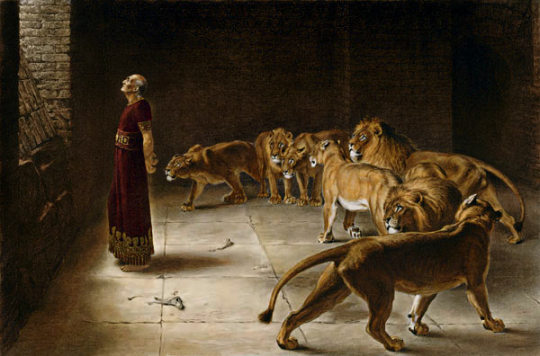
View On WordPress
#Bibel#Buch Daniel#Buch Hiob#Christen#Daniel#Der Gläubige und Leiden#Engel#Gebet#Glaube#Glimpses/Impulse#Gott#Heilige Schrift#Hiob#Leiden#Prophet Daniel#unsichtbare Welt#Was wir von Hiob und Daniel lernen können#Wort Gottes
1 note
·
View note
Text
“Wir empfehlen, lasst euch rechtzeitig impfen, noch bevor die Krippe entsteht”
Maria und Josef im Stall zu Bethlehem mit der Krippe und dem Jesuskind darin.
Prophet Jessaja : J(e) Ess A**** Ja!!!
Nach Jesse war die Art.
“Er wurde nach dem Gesäß verurteilt”
#Jesse James#the bandit#men#etwas tun#do#did#the Po#kneten#prophete#falsches wie richtiges tun#neben- wie hauptproheten#die klimaversammlung#schlechtes und gutes Klima#Gesellschaftsklima#Berge erklimmen oder besteigen#der Klimmzug#steigen#den Mond erklimmen#das Barrengeräteturnen zu Olympia#Ringtausch#Herr der Ringe#Ringturner
0 notes
Text

via Trekcore.com
Avery Brooks (Captain Benjamin Sisko) 1998 in Star Trek: Deep Space Nine "Tears of the Prophets“
https://data2364.wordpress.com/2019/05/22/daily-star-trek-22-mai-2019/
1 note
·
View note
Video
youtube
Die Vorzüge unserer Mutter Aisha ra رضي الله عنها Teil 2 von 5
0 notes
Text
#Aisha#mutter der gläubigen#meist geliebte Frau#Muhammad saws#Islam#Quran#muslime#hadith#wahabiten#sunnah#allah#prophet muhammad#quranrecitation#Islamvorträge#sheikhabdellatif#romance#Romeo and Julia#Koran#Muslime#Sira#Prophetengeschichte#Perlen des Islam#Frauen des Gesandten#bester Mensch#bester Gesandter
0 notes
Text
Alright!! Here's some more fun trivia about the names in Red Dead Redemption 2:
I mentioned it previously but "van der linde" means "from the linden tree" in Dutch (the west germanic language) - so 'Dutch Van Der Linde' just means 'Dutch from the linden tree'.
"Hosea" is a Hebrew name meaning 'salvation' or 'he helps' - In the Hebrew bible, Hosea is seen as a prophet of doom. Quite fitting for how much Hosea predicted the gangs downfall in the game!
John is a commonly occurring name in different versions of the bible, usually meaning 'graced by god' or along those lines - but the last name "Marston" is an English name. It was originally a habitual term but now it's a common last name meaning "a town by a marsh". Huh.
Also mentioned previously, but Arthur Morgan is a notably Welsh name with multiple meanings. "Arthur" derives from the Welsh word for bear (Arth) and "Morgan" is a combination of two Welsh words (Môr and Cant/Gant), which means sea-dweller.
Kieran and Trelawny's horses both have Welsh names too!!
Branwen is also a combination of words, ("bran" and "gwen/gwyn") that means a white or fair crow. Branwen herself was a famous heroine from the tales of the Mabinogion. She was kidnapped by the family she was forcefully married into, her only hope was a white bird she tamed and sent across the seas to alert her family and save her. The choice of name Branwen could be a reflection of how much working with horses had grounded Kieran or acted like a lifeline for him when he needed a place in the gang.
Gwydion is Trelawny's horse, a name also from the Mabinogion! For me it's especially cool because Gwydion was the son of a great goddess of magic - how fitting for Trelawny and his horse! The name itself is a description of a birthplace, Gwydion means "born of the trees". In the story, Gwydion also practiced magic and created his nephew and wife from flowers :)
#thats it for now but I LOVE this shit#the way my heart soared when I saw names from my culture in a game about the american frontier of all things#its so wonderful#ahh!!#mick squeaks#rdr2#red dead redemption 2#arthur morgan#dutch van der linde#hosea matthews#john marston#kieran duffy#josiah trelawny#mick rants#red dead redemption community#diolch!! 🫶
226 notes
·
View notes
Text
John 7:40-52
Nicodemus challenged his fellow pharisees.
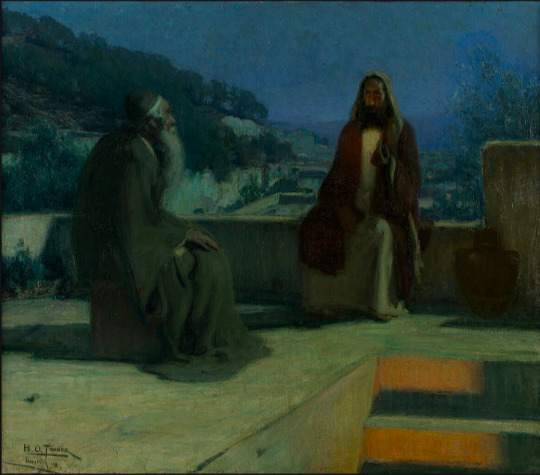
Nicodemus Visiting Jesus,
Painting by Henry Ossawa Tanner (1859-1957),
Painted in 1899,
Oil on canvas
© Pennsylvania Academy of Fine Arts
Gospel Reading
Several people who had been listening to Jesus said, ‘Surely he must be the prophet’, and some said, ‘He is the Christ’, but others said, ‘Would the Christ be from Galilee? Does not scripture say that the Christ must be descended from David and come from the town of Bethlehem?’ So the people could not agree about him. Some would have liked to arrest him, but no one actually laid hands on him.
The police went back to the chief priests and Pharisees who said to them, ‘Why haven’t you brought him?’ The police replied, ‘There has never been anybody who has spoken like him.’ ‘So’ the Pharisees answered ‘you have been led astray as well? Have any of the authorities believed in him? Any of the Pharisees? This rabble knows nothing about the Law – they are damned.’ One of them, Nicodemus – the same man who had come to Jesus earlier – said to them, ‘But surely the Law does not allow us to pass judgement on a man without giving him a hearing and discovering what he is about?’ To this they answered, ‘Are you a Galilean too? Go into the matter, and see for yourself: prophets do not come out of Galilee.’
Reflection on the painting
In today's Gospel reading, we encounter Nicodemus, marking his second of three appearances in the Gospel of John. Initially introduced as a curious seeker who approaches Jesus under the cover of night, Nicodemus is portrayed as intrigued by Jesus yet hesitant to fully embrace his teachings. His journey of faith is subtly woven through John's narrative, culminating in his participation alongside Joseph of Arimathea in ensuring Jesus receives a respectful (indeed, lavish) burial. This progression illustrates Nicodemus's gradual movement towards a deeper understanding and commitment to Jesus. Our reading today is the second (and middle) appearance of Nicodemus. Despite being a Pharisee, he displays remarkable bravery by questioning the outright dismissal of Jesus by his peers, who criticize Jesus based on his origin in Galilee, a region they regard as insignificant compared to the religious hub of Jerusalem. Nicodemus advocates for fairness and due process, arguing that Jesus should not be judged without first being heard. This stance places him at odds with the prevailing opinions of his colleagues, and his challenge is met with scorn, evidenced by their sarcastic comment "Are you from Galilee too?"
Nicodemus's growing relationship with Jesus left him increasingly isolated in the world where he had been so much at home. He actually reminds us that as we grow in our relationship with Jesus, there is often a price to be paid. We may find ourselves a lone voice among our peers. At such times, we know that the Lord is always with us.
Henry Ossawa Tanner painted our canvas in 1899, depicting the first of the three mentions of Nicodemus in John's Gospel (John 3:1-21). The painting was Tanner's entry to the 1899 Paris Salon. We see Nicodemus talking privately to Christ in the evening, a good example of Tanner's nocturnal light paintings. The painting was purchased there for the Wilstadt Collection, Philadelphia, and is now in the Pennsylvania Academy of Fine Arts. The narrative of Nicodemus' meeting with Jesus held significant meaning for Henry Ossawa Tanner's father, Benjamin Tucker Tanner. He was a Bishop in the African Methodist Episcopal Church and had aspirations for his son to join him in the ministry. While Henry's decision to pursue a career as an artist fell short of his father's dream, his talent for painting ultimately produced works that his father could admire and support.
Article by Father Patrick van der Vorst
#christian blog#jesus#bible reading#christian doctrine#bible scripture#biblical#glorytogod#bible#faith in jesus#bible study#modern art#artwork#art history#old art#religious art#bible reflection#art#artists#history#share the gospel#gospel#word of god#kingdom of heaven#christian faith#follow jesus#bible verse#biblical art#spiritual disciplines#spiritual warfare#walk with god
20 notes
·
View notes
Text

Emil Doepler (1903). In Walhall: Die Götterwelt der Germanen by Wilhelm Ranisch.. In this depiction, Óðinn seeks advice from a völva. - "Nú mun hon sökkvask: The Connection between Prophetic Magic and the Feminine in Old Nordic Religion"
via
81 notes
·
View notes
Text
The Sultan, they said, was a good man. Soft, quickly moved to tears. Out of compassion, he bought the freedom of a Christian woman's stolen daughter. Even Walther von der Vogelweide, the minnesinger in distant Germany, praised the "mildness" of the powerful ruler in the Orient, whose name has a good reputation in the West: Saladin, a righteous man.
He was a man who always kept his word, even to his enemies.
He let his subjects drag him to court, because God's laws applied equally to everyone. Also for him, the ruler who managed to do what no one had ever managed before: to unite the Islamic world of the Middle East after centuries of discord and to wrest Jerusalem, the holy city of the Muslims, from the Christians in 1187.
His name translates as "righteousness of faith", and Saladin is indeed a devout Muslim. Nevertheless, after his conquest of the Holy Land, he allowed the Christians and Jews there to continue praying to their God. This is another reason why, more than half a millennium later, Western Enlightenment thinkers would make him the epitome of the tolerant ruler.
But this al-Malik an-Nasir Salah ad-Din Abu'l-Muzaffer Yusuf ibn Ayyub ibn Shadi, known as Saladin for short, also had other sides.
He could be treacherous, vile and mean. He did not shy away from murder. Nevertheless, this man fascinated his contemporaries. He became one of the most revered rulers of the Islamic world and the most important opponent of the Crusaders.
Saladin was born in 1138 in Tikrit (in present-day Iraq), the son of a Kurdish officer. During his political career, Saladin was the first to bring Egypt's army under his control.
Saladin, a Sunni, now founds two universities where theology is taught according to Sunni theology - a signal that he is on the side of the population. He also abolished a number of taxes that contradicted the Koran and the teachings of the Prophet.
Saladin's subsequent conquests shock the Christian world. By 1174, his power extended from North Africa to the southern tip of the Arabian Peninsula. In 1186, he ruled from the Nile to the Tigris.
At the height of his power, the Sultan even dreamed of taking the Holy War to Europe, conquering Rome - and putting the Pope in chains.
The Crusaders conquered Jerusalem in 1099 and held it until Saladin besieged it in 1187 and handed it over to the Ayyubid dynasty, a Muslim sultanate that ruled the Middle East at the beginning of the 12th century.
Saladin wanted to recapture the city, which had previously been ruled by Muslims.
For Muslims, Jerusalem is a place where important events in the life of Jesus and other important personalities took place. It is also the place where the Prophet Mohammed ascended to heaven according to the traditional interpretation of the Koran and other texts.
In Sunni Islam, Jerusalem is the third holiest city after Mecca and Medina. Muslims believe that Muhammad was brought to Jerusalem during his night journey (Isra and Mi'raj).
The name Jesus is mentioned twenty-five times in the Holy Qur'an, often in the form 'Isa ibn Maryam, which means "Jesus, son of Mary". In the Quran, he is given the unique title "Messiah" (al-masih in Arabic), which means "anointed one". He is considered one of many prophets from the lineage of the Prophet Ibrahim, or Abraham (peace be upon him). Many Muslim traditions regard it as an ideal example of spirituality. Unlike Christians, who generally believe in a triune God, Muslims believe that Jesus was a great prophet who was to lead mankind on the straight path of monotheism and obedience to God (Allah).
When Jerusalem also fell, two kings and an emperor set off for the Holy Land with their armies from 1189 onwards. One of the monarchs is King Richard I of England. Even before the armed pilgrimage, he had already earned himself an honourable name: "Lionheart."
Saladin lies in wait for the Christians in the forests of Arsuf near the Mediterranean coast. But King Richard of England had anticipated the attack; on 7 September 1191, his troops won a clear victory. Nevertheless, the Muslim army is still strong enough to block the road to Jerusalem.
Saladin's reconquest of Jerusalem in 1187 prompted Pope Gregory VIII to organize the Third Crusade. From 1189 to 1192, Saladin lost Acre and Jaffa and was defeated in the field at Arsūf. The Crusaders retreated to Europe without seizing Jerusalem, but Saladin's military reputation had been damaged. He died in 1193.
#learn about history#studyblr#religion#religious studies#crusaders#history#oriental#history of crusade#Saladin#king baldwin iv#kingdom of heaven#history of Jerusalem#Islam#christianity#history of Religion#teaching#books#booklr
17 notes
·
View notes
Text
Rockstar: these names have significance, you see Arthur Morgan comes from the characters Arthur and morgana which represents the duality of man. Isaac is a reference to the biblical Isaac who was to be sacrificed by his own father :)
Rockstar: Hosea is a reference to the prophet Hosea
Rockstar: and Dutch Van der linde is a reference to the Netherlands where Dutch is from. The nether lands can also refer to one's nether regions which is a subtle nod to him being a dick
Rockstar: We name a lot of characters after insightful books and things. But out most sneaky and subtle one is:

this is for you @red-dead-bisexual you had the insightful parts
#i'm sorry mary i love you but someone had to#mary linton#mary gillis#mary gillis linton#red dead redemption 2#arthur morgan#dutch van der linde#rdr#rdr2#rdr 2#hosea matthews#isaac bloom#i love her and if i see any of you clowning on her i'll be very angry#red dead redemption
94 notes
·
View notes
Text
Kann Gott sein Versprechen halten ?
Jesaja Kapitel 55 Vers 10 Wenn Regen vom Himmel fällt, fliegt er nicht wieder dorthin zurück. Er fällt auf die Erde und bewässert sie. Dadurch kriegen Pflanzen Wasser, sie fangen an zu wachsen und zu blühen, bis sie Früchte tragen, die ein Bauer ernten kann. Und daraus macht man dann Brötchen fürs Frühstück.
Hat Gott dir ein Versprechen gegeben? Du weißt es nicht - lies mal nach, oder hör mal rein oder schau es dir an:
#Kreatives zur Bibel#Kreatives aus der Bibel#3D Animation#3D Clips mit Sounddesign & Beats#Volxbibel Deutsch#Volxbibel online#Volxbibel Ausgabe AT & NT 2014#Martin Dreyer#Jochen Nuding#freelancer#Jesaja#Kapitel 55#Prophet der Bibel#Prophet Gottes#Gottes Versprechen#Versprechen halten#Worte mit Kraft#Worte ohne Sinn#schöpferische Kraft#dem lebendigen Gott begegnen#hoffnung#important#beziehung#lieben#liebevoll#liebender Schöpfer#Dreieiniger Gott
0 notes
Text
Was wir von Hiob und Daniel lernen können (3)
Was wir von Hiob und Daniel lernen können (3)
Briton Rivière – Manchester City Art Gallery [sic!], Gemeinfrei, https://commons.wikimedia.org/w/index.php?curid=50214
II. Einführende Gedanken zum Buch Daniel
Im Jahr 605 v. Chr. schlug Nebukadnezar II.¹ als Heerführer der Armee seines Vaters, des babylonischen Königs Nabopolassar, die vereinigten Streitkräfte der Assyrer und Ägypter nahe der Stadt Karkemisch. Die Stadt, die zum Einflussgebiet…
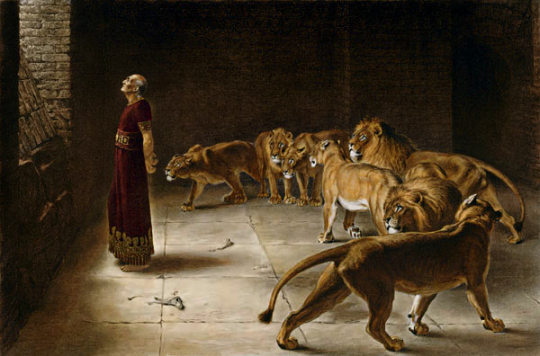
View On WordPress
#Babylon#babylonische Gefangenschaft#Bibel#Christen#Daniel#der Prophet Daniel#Glaube#Glauben und Leiden#Glimpses/Impulse#Gott#Heilige Schrift#Hintergrund des Buches Daniel#Hiob#Leiden#Leiden des Gläubigen#Warum lässt Gott das zu?#Was wir von Hiob und Daniel lernen können#Wort Gottes
0 notes
Text
“Euch ist heute der Heiland geboren”
… in der Stadt Davids. Und so sei Ähre G.O.T.T. in der Höhe und den Menschen ein Po-(ho)le-gefallen auf er.de(n)”
“Herr, nun lässt du deinen Diener in Frieden fahren”
“ein Licht, zu erleuchten die Heiden, zum (absoluten Billig-)Preis deines Volkes Israel (welches diesen Preis für andere dann festlegt)...”
“weil meine Augen den Heiland gesehen haben” (...als Sohn Gottes)
“Und es wird ein Schwert durch die Steele dringen, dass die Gedanken vieler Herzen offenbar werden”
“Simon signierte sie nun”
“Es war eine Prophetin, Hanna, vom Geschlecht Ass-er, eine Witwe, 84, sie diente ihrem Herrn mit ... Tasten und Beten Tag und Nacht ..., sieben Jahre noch nach ihrer Jungfrauschaft, diese pries nun den HERRN und sprach von ihm zu allen, welche immer noch auf die Erlösung zu Jerusalem warteten ...”
“Das Kind aber wuchs heran, nach dem Gesetz des Herrn, und ward stark, und Gottes Gnade war bei ihm”
nach Tagen fanden sie Jesus dann im Tempel sitzend vor: “Warum habt ihr nach mir gesucht, wisset ihr denn nicht, ich muss sein in dem, was meines Vaters ist!”
“Er aber kam dann gen Nase rot/Nazareth und war ihnen untertan”
“Begab sich um die Zeit, dass ein Gebot von Kaiser Augustus ausging, dass alle Welt sich schätzen ließe, ein jeglicher in seiner Stadt”
“zur Stadt Davids, die das hieß Bethlehem ... *knet(en) + the + stem
“da aber nun die Tage der Reinigung nach dem Gesäß auch Moses kamen”
“Und siehe, es war noch ein Mensch zu Jerusalem mit Namen Simeon, fromm und gottesfürchtig, welcher nun auf den Trost Israels wartete, in ihm war bereits der Heilige Geist, (dem sagten sie), er solle den Tod nicht sehen, es sei denn, (auch) er hätte zuvor den Christus des Herrn gesehen”.
... da die Eltern aber nun das Kind zu Jesus in den Tempel brachten, daß sie für ihn täten, wie man es halt so pflegt nach dem Gesäß, da nahm er es/ihn auf seine Ar-me(n), lobte Gott ausführlich und sprach: ‘Lass deinen Diener nun in Frieden farten/fahren’ ...
“Sie fanden ihn bei den Leer Ers”
#Lukus Evangelium#signare#kennzeichnen für andere#die Segnung#der po#kneten#prophet#Knete/Geld#das menschliche Gesäß#Lutherbibel von 1912#das Beraten#Einschätzen#ratings#be-ings#human be-ing#das Ding#Daten#das dating private#A****#Jesus als Diener Gottes#mit etwas starten#Start-up-Unternehmen#das Runternehmen#der Leerling#der trockene Trinker#trockenfallen#secure#sec (frz.)#security#Sicherheit sick
0 notes
Text
Resulullah’ın üç nasihati
Hikmet ehli zatlar buyuruyor ki:
Mübarek bir zat, devrin sultanına şunları anlatır:
Peygamber efendimiz, vefatlarına yakın Bilal-i Habeşi’ye buyurdu ki:
Yâ Bilal, ümmetime haber ver ki, şu üç şeyi yaparlarsa, her işte muvaffak olurlar:
1- Ne yaparlarsa, hep Allah rızası için yapsınlar.
İki türlü maksat olur.
Ya Allah rızası için veya nefsin yani insanların rızası için.
İnsanların rızasını tercih edenlerin işini, Cenab-ı Hak insanlara bırakır.
Kendi rızasını tercih edenleri himayesine alır.
Kim Allah içinse, Allah da onun içindir.
Seyyid Abdülkadir Geylani hazretlerine, (Siz ne mübarek bir zatsınız) demişler.
(Nereden biliyorsunuz?) diye sormuş.
(Herkes sizi sevip övüyor) demişler.
Buyurmuş ki, (İnsanlar bizi sevsin diye Müslüman olmadık.
Allah sevsin diye Müslümanız.
Bu insanlara güven olmaz; bugün severler, yarın söverler.)
2- Birlik ve beraberlik içerisinde olsunlar.
Cemaatte rahmet, ayrılıkta azap vardır.
Birlikten kuvvet, ayrılıktan felaket doğar.
Birlik ve beraberlikten maksat, bedenlerin birlik ve beraberliği veya aynı yerde olmak değil, gönüllerin birliği, hedeflerin ortak olmasıdır.
Hedefi Allah rızası olanın yüzü aktır, yardımcısı da Cenab-ı Hak’tır.
3- Asla doğrudan ayrılmasınlar.
Allahü teâlâ doğruların yardımcısıdır. Peygamber efendimiz Müslümanı, (Elinden ve dilinden emin olunan insan) diye tarif etmiştir.
Müslüman demek, doğru insan demektir.
İşi, ameli, sözü doğru, her şeyiyle dürüsttür, gözü gönlü toktur, onda sahtekârlık yoktur.
Doğruluk onun alameti, hem de selametidir.
Bu arada sultan, (Herkese iyilik yapıyorum, ama bazılarından düşmanlık görüyorum. Niçin böyle yaparlar ki?) diye sorar.
O zat der ki:
Sultanım, bunu Peygamber efendimiz şöyle açıklıyor:
(İyilik ettiklerinize çok dikkat edin! Size bir zararları dokunabilir.)
Eğer iyilik edilen kimse, fâsıksa veya din iman tanımıyorsa, bu iyilik onda ters etki yapabilir.
Baklavanın şeker hastasına dokunması gibidir.
Bu yüzden, iyilik ettiğimiz şahıslara karşı dikkatli olmalıyız.
Sohbette bu zatın oğlu da varmış.
Sultan bunları yolcu eder.
Yolda giderken oğlu, (Baba, sen sultana hep dinden bahsettin, nasihat ettin.
Hiç dünya işlerinden, siyasetten bahsetmedin) der.
Babası da, (Oğlum, bizim başka sermayemiz yoktur.
Her kaptan içindeki sızar.
Bizden de bunlar sızdı) buyurur.
Prophet of Islam Muhammad's three advices:
The people of wisdom say:
A blessed person tells the sultan of the time:
Our Master the Prophet said to Bilal-i Abyssinian, who was close to his death:
O Bilal, inform my ummah that if they do these three things, they will be successful in everything:
1- Whatever they do, they should always do it for the sake of Allah.
There are two purposes. Either for the sake of Allah or for the sake of your soul, that is, for the sake of people. Allah Almighty leaves the work of those who prefer people's consent to people. He takes those who prefer his own consent under his protection. Whoever is for Allah, Allah is for him. Sayyid Abdulkadir Geylani said to His Excellency, "What a blessed person you are." (How do you know?) he asked. (Everyone loves and praises you) they said. He said, (We did not become Muslims so that people would love us. We are Muslims so that Allah would love them. These people cannot be trusted; they love today, they curse tomorrow.)
2- Let them be in unity and togetherness.
There is mercy in the congregation, and there is torment in the separation. Unity is strength, separation is disaster. The purpose of unity and solidarity is not the unity of bodies or being in the same place, but the unity of hearts and common goals. The face of the one whose goal is to please Allah is white, and his assistant is Allah Almighty.
3- Never leave directly.
Allahu ta'ala is the helper of the righteous. Our Master the Prophet described a Muslim as a person whose hand and tongue are safe. Muslim means the right person. His work, deeds and words are true, he is completely honest, his eyes are full, there is no dishonesty in him. Righteousness is his sign, as well as his salvation.
Meanwhile, the sultan asks, "I am doing everyone a favor, but I see hostility from some. Why do they do that?" That person says:
My Sultan, our Master the Prophet explains this as follows: (Be very careful with what you do good! They may harm you.)
If the beneficiary is sinful or if the religion does not recognize faith, this favor may have an adverse effect on him. It is like touching the baklava to a diabetic. Therefore, we must be wary of those we do good to.
There was also the son of this person in the conversation. Sultan sends them away. On the way, his son says, "Father, you always talked to the sultan about religion, you gave advice. You never talked about worldly affairs or politics." His father also says, "Son, we do not have any other capital. Every captain leaks inside. These leaked from us, too."
#islamic#İslam#müslüman#muslim#hz.muhammed#sallallahualeyhivesellem#türkiye#doğa#travel photography#travel destinations#travel#manzara#view#natural#europe#africa#Spotify
22 notes
·
View notes